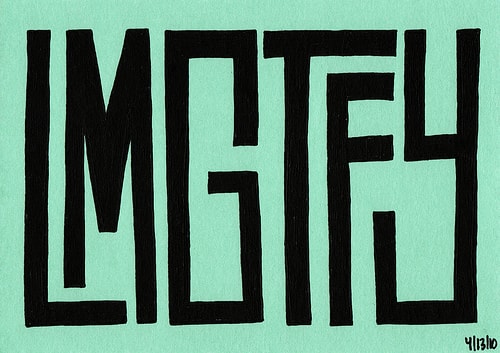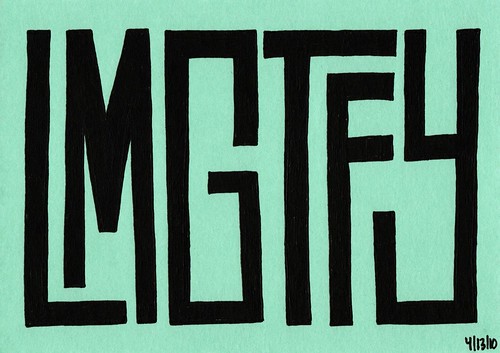Online access to reference materials is amazing. Want info on a movie’s cast? imdb.com. Need to know how much money that movie made yesterday? boxofficemojo.com. Then there’s Wikipedia. Despite attempts to game the system and despite sometimes overzealous volunteer editors, Wikipedia is an extraordinary source for summary information on nearly any topic, usually with robust citations for those who want to learn more.
As we revel in this luxury of ready access to answers, it’s worth considering the tradeoffs. Knowing provides closure, but the mystery of not knowing inspires curiosity, wonder and a shared quest for answers. Are we losing the richness of the mystery? Are we corrupting our freedom to even ask those around us what they know?
LMGTFY (Let Me Google That For You)
“Just Google it” is such a conversation killer. The ease of finding answers is creating a moratorium on asking basic questions. Rather than sharing a simple answer, there’s a snarky expectation that everyone do the same basic research rather than asking friends. It’s miserly.
It destroys the oral tradition that includes not only the answers but layers of richness. The individual’s perspective on the issue. Their unique way of talking about it. How important it is and why. What other perspectives people have. Who else is an expert. The answer is not enough. Without the context – the metadata so to speak – we’ll never really understand the answers to our questions.
The Laziness and Danger of Simple Answers
Saying “Just Google it” is more lazy than someone asking a question without Googling it. It’s a static perspective, that if a question has an answer, we don’t need to examine the question anymore. That question has an answer, and that’s all we need to know. That question has an answer, and nothing we do can ever make the answer anything else. If we know the answer, we also never have to be curious about other points of view. Why would we? We can hide behind The Answer. How lazy and stagnant!
Easy access to superficial answers has killed our curiosity and made us vulnerable to anyone skillful enough to create an innocent story around darker plans (see Privacy and the NSA or Too Big To Fail banks). This lack of curiosity is mirrored in what news outlets feed us: headlines with no depth on a small set of stories prioritized by a few decision makers. What if we demanded more?
Last week, ProPublica published Bank of America Lied to Homeowners and Rewarded Foreclosures, Former Employees Say. This is a deeper look into the question of “how are the banks aiding the recovery from the real estate crisis?”, but it’s unlikely that any major news outlet will run with the story. The stock answer of “oh, the banks got bailed out and paid the government back and are doing better now because of new government laws” distracts us from engaging in deeper analysis and demanding accountability.
The Land of Incomplete Information
What if we didn’t have the answers? What if we were in the land of incomplete information? What if it was amazing? What if a little delayed gratification on finding out the stock answer to our question led to a more thorough understanding of the issue and…AND deeper connection with those around us from talking about it? Is it worth not knowing for a few minutes? What would it take for us to try it out?
The question starts the conversation. The answer ends it. Let’s start more conversations and let them flourish in the land of incomplete information. Let’s set aside our egos and be okay with talking about something without knowing everything. We might even need to admit the things we don’t know. Terrifying, right?
Let’s Play
How about a game like 20 Questions, except the questions don’t get answered. I ask you a question, and we talk about what we know about the topic. You might ask me a follow-up, like “What’s important about this question to you?” You might share what you know. Or something completely unexpected might happen. We keep it going for a while, and then the next of the 20 questions gets asked. And after we have 20 questions, then we can go back and look up any answers that matter. My guess is that we’ll won’t care about looking up all 20 answers but that we will have learned a lot more than 20 facts.
Who’s up for a game?





For those up for playing the 20 Questions game, what would your first question be?
I’ll start with one that occurred to me while looking at a wall of clocks at the library yesterday: when did time zones get created?
I remember reading about how time zones came to be. It had to do with railroads offering what was then high speed travel and needing to publish schedules of arrival/departure times that would make sense across the many cities that the train serviced. In the 1800’s every city kind of had their own local solar time, that had no syncing with cities 100 miles away say. Eventually the telegraph brought a more world-wide need for recognizing time in different areas.
Thanks Doug, I didn’t know that.
Such a needed article. We’ll killed our curiosity about things and take news found on the internet to be true. And we’ve lost our ability to think and discern.
Having a curiosity mindset is so important in business and life. We get into the deeper why answers that are the real gems to communication and relatedness. Thanks for a great article.
Thanks Eva. Yeah it all seems to come back to curiosity and a slower pace.
interesting article, arthur! it’s actually astounding to me that we can find the answer to anything we might want to know in just a few seconds (we don’t have to make a trip to the library anymore!). i agree that this could very well end a conversation before it starts. however, i don’t think it necessarily kills curiosity. i’ve observed how this plays out with my own kids. at 20 and 15, they’ve grown up with google pretty much a constant in their lives. but they don’t just blindly believe everything they read. they still actively seek out different sources and research what they want to know more about in greater depth. in this way, google serves as an excellent tool for pointing them in the right direction. in fact, we’ve had many intense conversations over the dinner table that were begun by asking “the google” a question! [of course, sometimes i just feel lazy and want that quick easy response!] thought-provoking (thanks).
Love the article, but on the other hand, I also do like the ability to find information on just about anything whenever I need it. Matt and I have done a lot of projects around our house without having to take classes and spend significant amounts of time and money to learn things.
On the other hand, I really dislike the dismissive “just google it” and agree that it shuts down communication. Arthur, have you read Marshal Rosenberg’s book on NVC (non-violent communication)? https://www.cnvc.org/about/what-is-nvc.html
Lisa,
Yeah, there’s a lot of useful stuff online, don’t get me wrong. It seems to come down to balancing need vs. want. Or engage vs. retreat. I haven’t read the book, but I’ve encountered NVC a bunch of times over the last few years. Might be time to read it soon.
Arthur